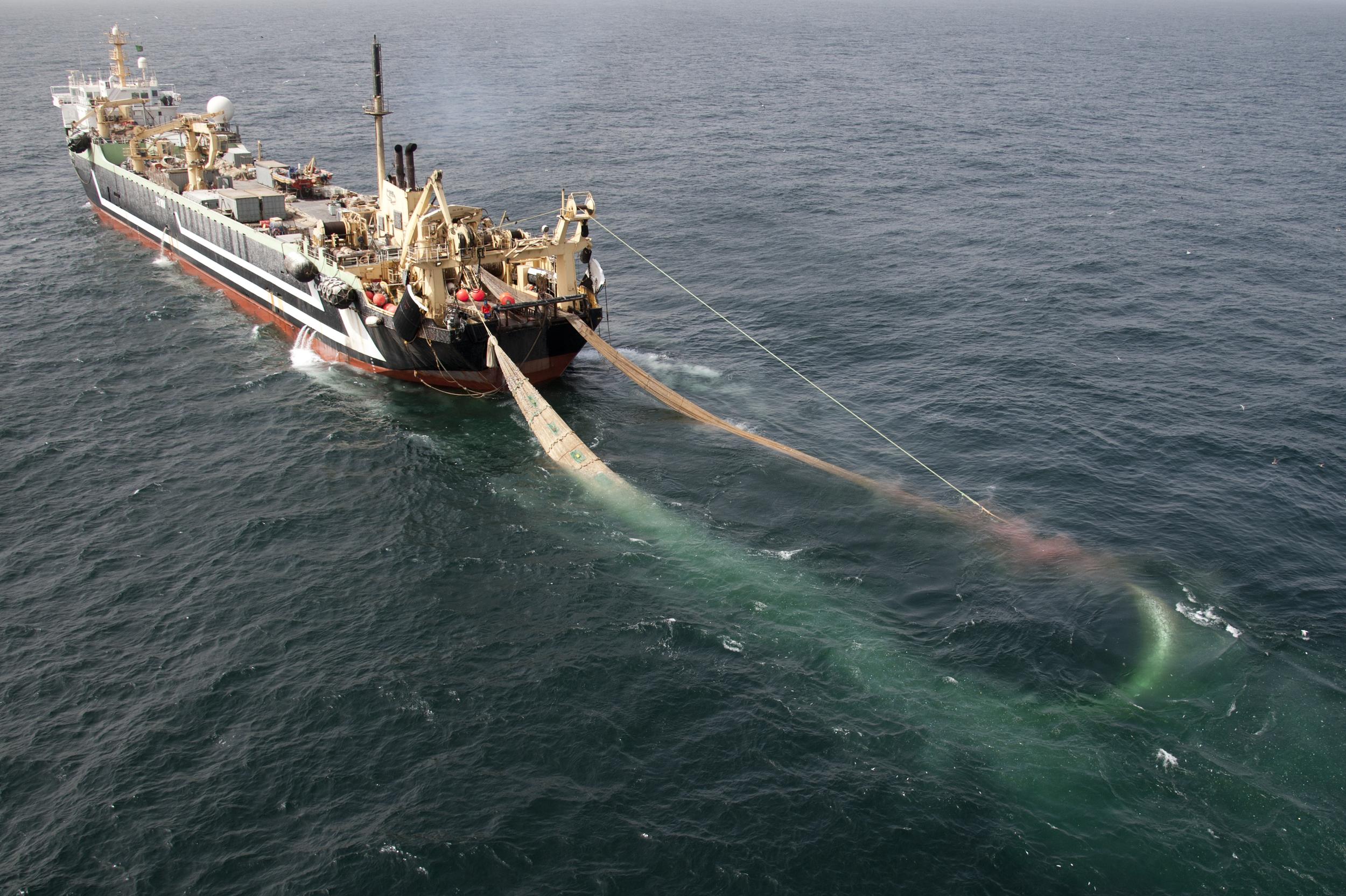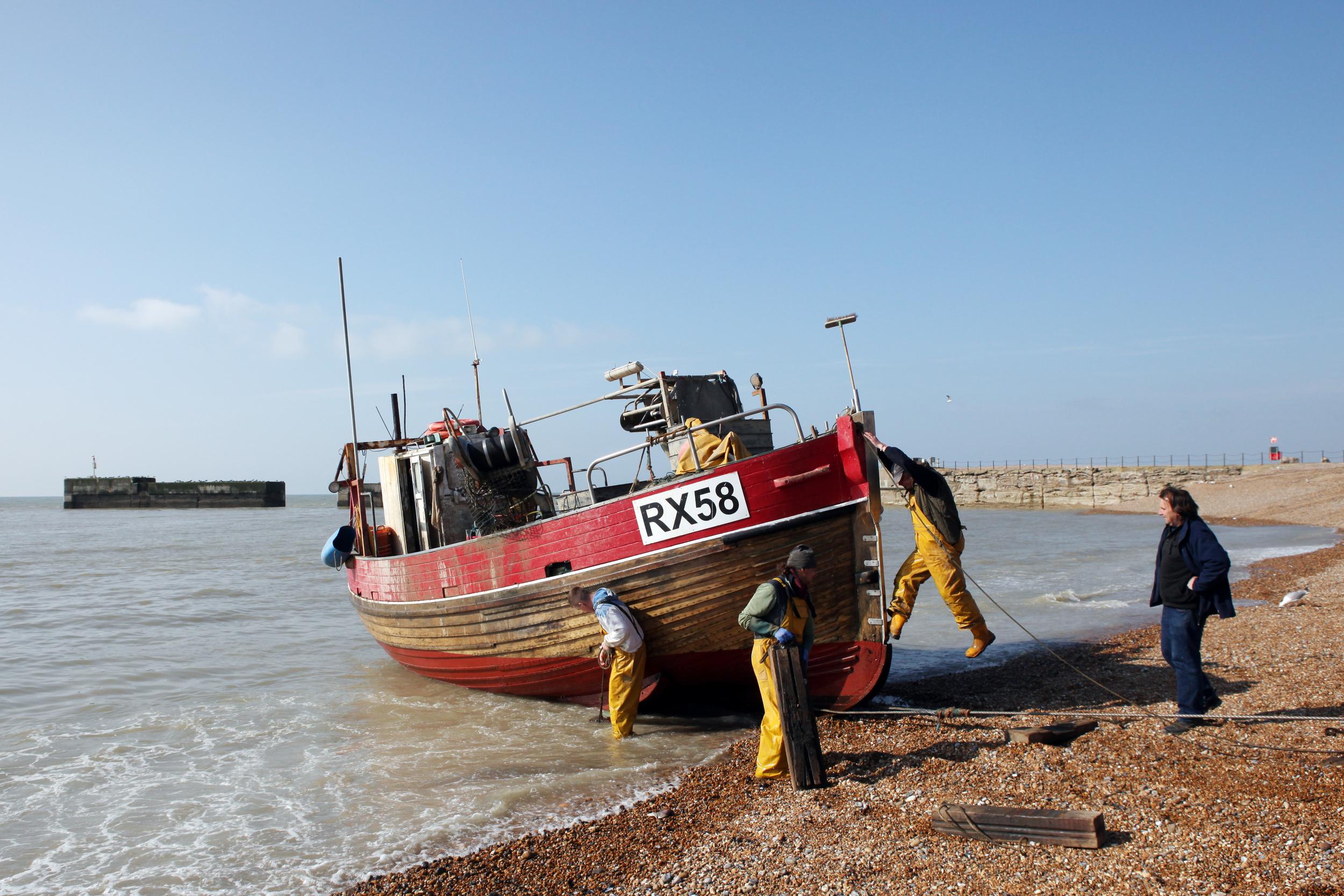During my time at Greenpeace, I’ve sat in a tiny boat in the middle of the Indian Ocean, watching a fishing boat pull in miles of drift nets. The nets were full of tuna, but there were also dead spinner dolphins, manta rays, thresher sharks and more – a grim demonstration of devastation at sea. I’ve been right up close with some of the biggest fishing vessels in the world, watching as they haul out incomprehensible amounts of fish.
But I’ve also sat in rooms with people from fishing communities, who rely on fish for their food and livelihoods. These people are struggling to scratch together a living and are looking ahead at a bleak future.
In many places, including the British Isles, these communities are up against a fleet of industrial fishing ships, including supertrawlers and bottom trawlers, which devastate ocean habitats and leave little for these small-scale fishers to catch.

Giant fishing ships known as ‘supertrawlers’ can pull up hundreds of tonnes of fish a day using nets up to a mile long. © Pierre Gleizes / Greenpeace
There’s no simple solution to fix these problems. And more than this, industrial-scale destructive fishing isn’t the only problem affecting our oceans.
Is going vegan the only answer to overfishing?
Seeing the destruction of the natural world, both on land and at sea, has moved more and more people to go vegan. This is a good thing. In places like the UK – where we have the luxury of more choice in our diet – the more people that turn to a plant based diet, the better.
Greenpeace campaigns for all those who can to eat less meat, fish and dairy. If you do eat fish, get it from small-scale fishers if you can. If you can’t buy it direct to ensure where it comes from and how it’s caught then by all means exclude it from your diet or choose based on the Marine Conservation Society’s Good Fish Guide.
But although it’s part of the puzzle, veganism isn’t a silver bullet for our oceans. That’s because overfishing is just one of many serious threats to the oceans.
Climate change is hurting sea life and destroying ocean habitats, seen in coral bleaching events and algal blooms. Then there’s the plastic crisis, the dumping of fishing gear, and pollution from sewers, farms, factories and mines running into rivers and out to sea.
Only some of these problems can be solved by everyone going vegan. But if you want to go vegetarian, vegan, or even cut down on fish, meat or dairy, there are many brilliant ways to start doing that.
Here are some tips on how to eat more plant-based food, and here are vegan recipe ideas from Greenpeace UK staff.
But individuals changing their diet can only do so much. For change to happen at a serious scale, governments need to be part of the solution.
Greenpeace (alongside scientists, civil society and many governments) is campaigning hard for the world’s oceans.
Specifically, we want all of the oceans managed sustainably and in the public interest, and at least 30% fully protected from all threats by 2030. Protecting at least 30% is also what scientists tell us is needed in order to restore fish populations and keep our oceans healthy.
Putting a third of the oceans off-limits to fishing, seabed mining, and any other industrial activity would be one of the biggest conservation efforts in human history.
It would also be a huge increase on the level of ocean protection we have today (less than 5%).
This change would allow sea life to recover and adapt to threats like climate change, and make it easier for communities to keep living in harmony with the oceans.
Why not campaign to stop all fishing?
But to some people, 30% feels too low. They ask why we don’t campaign for 100% protection.
Putting 100% of the oceans off limits to humans would effectively mean a blanket ban on all fishing worldwide, including small-scale sustainable techniques that aren’t actually causing a problem.
This is not only unworkable – it’s morally wrong. Ending all fishing would deny billions of people (including some in the UK) their rights to food, work, and culture.
Many coastal communities live in harmony with nature, not taking more from the ocean than it can give. And these communities, especially in the Global South but including those around our own coastline, are amongst the most vulnerable in the world.

Small scale fishermen near a fishing boat in Hastings. © David Sandison / Greenpeace
Small-scale, sustainable fishing communities are often fighting multiple threats to their livelihoods, including climate change and industrial overfishing – both catastrophes that have been largely caused by the privileged Global North.
Many of these people depend on the oceans for their survival, and have no other options when it comes to finding food or work. They are in desperate need of allies prepared to speak up on their behalf.
And that solidarity runs both ways. We need these communities’ collective power to help pressure governments to agree to a strong Global Ocean Treaty that’ll allow fish and other ocean wildlife to recover and thrive. And we see throughout history that change happens when we work together.
How is Greenpeace working to stop industrial fishing?
Campaigning for at least 30% protection, means we need to campaign hard for the remaining ocean to be properly managed. As well as pushing for a Global Ocean Treaty on the political stage, Greenpeace has decades of experience of working out at sea, including on industrial fishing and its massive plastic pollution problem.
At any given time, Greenpeace’s ships are travelling the world to bear witness, do scientific research and confront all kinds of environmental crime. In just the last few years alone we have:
- Taken on the world’s biggest tinned tuna company.
- Dropped boulders to prevent harmful fishing practices inside so-called “protected” areas.
- Put our bodies in the way of unregulated fishing in the South-West Atlantic.
- Stood alongside local fishing communities in court cases supporting their right to fish over multinational companies.
- Advocated on behalf of migrant fishers for better working conditions onboard the world’s distant water fishing vessels
- Took action to urge the industry to stop dumping their fishing gear, which is estimated to make up 10-50% of plastic in the ocean.
This is the 2nd boulder barrier we’ve built. Last year we created one in Dogger Bank Marine Protected Area.
That’s now over 100 square miles of “protected” waters off-limits to bottom trawlers thanks to Greenpeace activists. 💪🎉💪🎉 pic.twitter.com/WgFcVaN3Ub— Greenpeace UK (@GreenpeaceUK) February 26, 2021
Check out the Take Action page to see what you can do to help today.
The overlapping environmental catastrophes we face on Earth and at sea do require better diet and lifestyle choices. But there isn’t one, catch-all solution to the problems affecting the world’s oceans.
Embracing this messy reality isn’t easy, and changing it can feel overwhelming. And I know from watching first-hand the destruction of marine life, it’s a devastating situation. But it is the right thing to do. And if we get it right, it could mean I never have to watch another shark pulled out of the ocean by a factory ship, or to meet with another fishing community that’s seen their way of life destroyed by big business.



